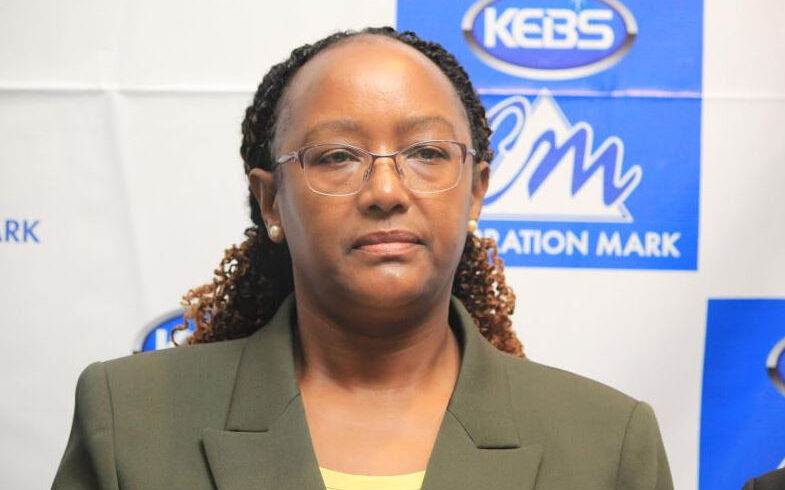
Kenya Bureau of Standards (KEBS) Managing Director Esther Ngari, during the World Meteorology Day on May 20, 2025. [Benard Orwongo, Standard]
The Kenya Bureau of Standards (Kebs) has said that the proposed Standard Bill 2025 is seeking to introduce a rigorous framework to effectively tackle unsafe goods in the market.
The legislation introduces a rigorous framework with mandatory standards for critical products, expanded licensing, and stronger enforcement powers to effectively tackle unsafe goods and misleading content.
Kebs Managing Director Esther Ngari told the National Assembly’s Committee on Trade, Industry and Cooperatives that the Standards Bill 2025 represents a strategic legislative modernisation that seeks to secure the integrity of markets, strengthen public protection, and promote industrial competitiveness in a globalised economy.”
“We are now part of global value chains, our manufacturing base has diversified, and our citizens demand higher standards of safety, health and environmental protection. Yet, our legal framework for standardisation has not kept pace with these realities,” she told the committee.
Follow The Standard
channel
on WhatsApp
She explained that the Bill is built on protecting the Kenyan consumer by ensuring that every product on the shelves and in the markets meets minimum safety and quality thresholds.
Its goal is to boost industrial competitiveness, with Ngari noting that this will be achieved by turning standards into tools for business growth and export readiness rather than barriers, while also strengthening governance and accountability through clearer mandates, streamlined enforcement, and independent oversight mechanisms.
According to Ngari, key reforms proposed in the Bill include establishment of KEBS as the National Standards Body of Kenya with an expanded and clarified mandate to develop standards, regulate certification, oversee metrology and monitor market compliance.
It will also see introduction of mandatory compliance for products that have direct impact on health, safety, or the environment, which is critical in ensuring that unsafe or counterfeit goods are not produced, imported or distributed within our markets.
“The bill proposes enhanced enforcement powers including the authority to halt production, seize noncompliant goods and mandate recalls for unsafe products. These are preventive measures that prioritize public safety,” she told the committee.
It has also called for establishment of a Standards Tribunal to ensure due process, fairness, and accountability in regulatory decisions to balance firm enforcement with business rights and investor confidence.
“This Bill does not seek to expand bureaucracy. It seeks to create clarity and predictability and make it easier for compliant businesses to operate while closing the space for non-compliant and illicit trade. It will also reduce regulatory overlap among agencies, by providing for harmonized frameworks and joint inspections where mandates intersect especially in areas such as food safety, industrial products, and environmental health,” she said.
Licensing and registration of key market actors, such as manufacturers, calibration service providers and importers, to promote transparency and traceability across the value chain has also been provided.
According to Ngari, modern standards are a foundation of industrial growth because they lower trade barriers, facilitate exports and assure trading partners of product reliability.
KEBS National Standards Council Chairman Dr Chris Wamalwa said the Bill is urgent, insisting that the 1974 Act is outdated.
He said the regional and global commitments demand harmony, noting that the new realities require agility, given that 99 per cent of Kenyan businesses are Micro, Small and Medium Enterprises (MSMEs).
Stay informed. Subscribe to our newsletter
“Substandard goods cost us Sh200 billion annually in health, safety and lost trade. Digital platforms sell everything from Mombasa matatu parts to Marsabit millet and quality must follow the click,” Wamalwa said.
The Standards Act, Cap. 496, which currently guides KEBS work, was enacted almost 50 years ago in an era when Kenya’s economy was smaller, less industrialized, and largely inward looking. Kenyans are expected to submit their views and written comments on the Bill by November 14.
Follow The Standard
channel
on WhatsApp



